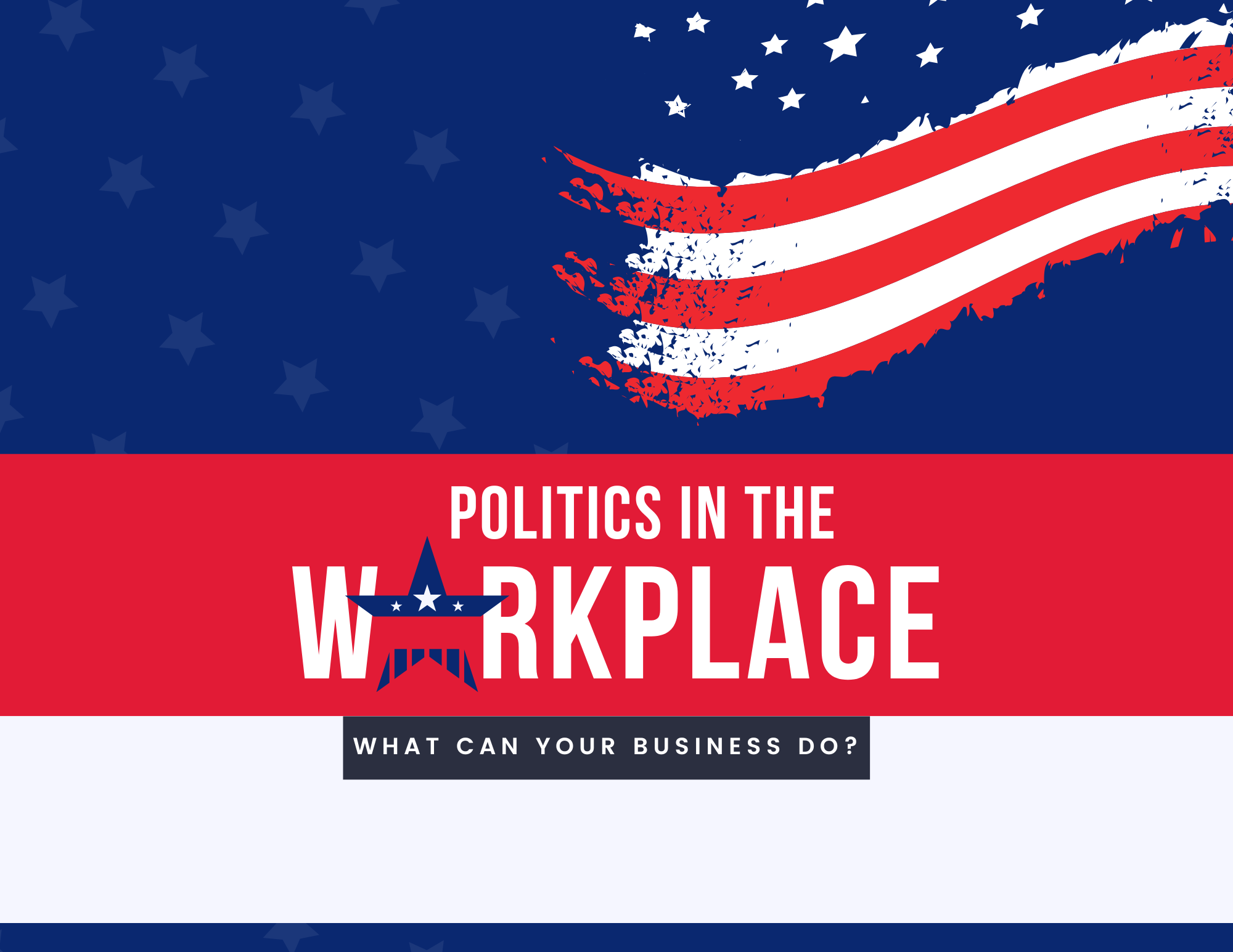You know it, the presidential election is happening. The days before these elections are filled with a lot of talk on “What if so-and-so wins?”, and the days after will be more of that same. Navigating political speech in the workplace can be a tricky area for employers during an election season. Many employers want to maintain a neutral, respectful environment where all employees feel comfortable, regardless of their political beliefs. However, I am often approached by clients asking how much control they have over political speech in the workplace and what actions they can take to regulate it. I hope this blog provides an overview of what you as a business owner need to consider when addressing political expression at work. Keep in mind, the majority of my clients are based out of LA, though I will include Federal laws for reference.
- Balancing Free Speech Rights and Workplace Harmony
It is essential to understand that the First Amendment right to free speech primarily protects individuals from government censorship; it does not apply to private employers. This means private-sector employers generally have the right to regulate or limit political speech in the workplace if they believe it could cause disruptions, create a hostile environment, or affect productivity. However, you must still approach this carefully to avoid negatively impacting employee morale or creating the impression of discrimination based on political views.
In Louisiana, as in most other states, there is no specific law that grants employees the right to political expression in private workplaces. However, certain employee protections exist under the National Labor Relations Act (NLRA), which allows employees to discuss work conditions and other work-related issues. While the NLRA does not cover political speech explicitly, it could come into play if employees discuss political topics that intersect with workplace issues, such as wage policies or labor laws. Employers should consider these nuances when creating policies around political speech.
- Setting Boundaries for Political Speech at Work
It is natural for employees to feel passionate about political issues, but passion can sometimes cloud sound judgement or distract us from priorities. Employers are within their rights to establish policies that restrict political discussions during work hours to maintain a neutral and productive environment. Employers can remind employees that discussions about political parties or candidates should be reserved for outside of work hours or during break times, outside of company property. This helps ensure that political opinions do not interfere with job responsibilities or lead to workplace tensions.
When crafting such policies, it’s crucial to apply them consistently across the board. Selective enforcement could lead to claims of discrimination or favoritism. It’s also a good idea for employers to emphasize that political discussions should be respectful and not harass or intimidate other employees, clients, or vendors based on political affiliation. A general “no tolerance” policy on harassment due to political beliefs can help prevent conflicts and reinforce a culture of respect.
- Regulating Political Signage and Flags in the Workplace
Flags, and other forms of visual political expression at work may be limited if employers feel they are a distraction in the workplace. For example, one of my clients had an issue where employees hung signs, and political party flags around their work areas. This was leading to conflicts in the workplace, and as such my client made it a policy to only allow the U.S. flag to be displayed.
Legally, this is okay as private employers can prohibit the display of non-work-related materials in the workplace, including flags or signs endorsing particular political candidates or movements. The primary exception to this rule involves union-related material, as employees have the right to display signs related to union activities under the NLRA. However, general political banners, slogans, or flags do not receive the same protections and can be restricted.
- Complying with Anti-Discrimination Laws
In Louisiana, employers can regulate political speech in the workplace, they must also be careful not to infringe upon employees’ rights under anti-discrimination laws. For example, Title VII of the Civil Rights Act of 1964 prohibits discrimination based on race, color, religion, sex, or national origin. Employers should ensure that any restrictions on political speech do not inadvertently target specific groups or beliefs, which could lead to claims of discrimination. Intent would not matter in this case, as the argument would be that the policy had a disparate impact on those protected characteristics.
Furthermore, Louisiana has its own employment discrimination, which aligns closely with federal anti-discrimination regulations. Policies should therefore be crafted in a way that does not disproportionately affect employees of a protected class. For instance, if a political symbol has cultural or religious significance, employers may need to evaluate whether the restriction could lead to perceived or actual discrimination.
- Encouraging Professionalism and Providing Resources
The goal of restricting political speech at work isn’t to stifle employees’ freedom to express themselves but rather to create an environment where everyone can focus on their work and avoid divisive issues. Culture is everything in a workplace, and anything that erodes or destroys business culture can negatively impact business operations.
Employers can encourage employees to engage in political activities on their own time outside of the workplace. You may also provide resources for employees who wish to be more politically active, though I would highly recommend not doing so, as it would jeopardize the image of neutrality. The only resources that should be provided to employees are information on registering to vote and locations for voting.
Additionally, you may consider providing training or resources that promote respect and professionalism, while reinforcing company policy. This can help employees understand the company’s stance on political neutrality and reduce misunderstandings.
In summary
While you as an employer may have a right to regulate political speech and expression within the workplace, you should approach this responsibility thoughtfully. By setting clear guidelines on political discussions, signage, and harassment related to political beliefs, employers can maintain a neutral and harmonious environment that prioritizes productivity and professionalism. Additionally, employers should keep anti-discrimination laws in mind when implementing these policies and apply them consistently.
With the election season almost done, now is an ideal time for your business to review its policies and make any necessary updates. Remember that these recommendations may vary by state, so if your business operates in multiple locations, consult local laws to ensure compliance. By managing political speech thoughtfully, employers can create a respectful workplace where everyone feels valued and focused on shared organizational goals. If you have any questions or concerns, feel free to reach out to Crescent & empact hr.
Alex Vial
HR Advisor, HR Services
Alex obtained his Bachelor of Science in Business Administration, with a focus in Human Resource Management from The University of New Orleans. He has worked in a variety of industries, including not-for-profit organizations, Telecommunications/IT, and Solar/Renewables. In his career, he has focused on human resource and legal compliance for companies operating in multiple states, Professional Development and employee trainings, employee engagement, onboarding, offboarding, and conflict resolution. Alex believes the best part of HR is helping companies create pro-employee cultures, increasing retention and reducing recruiting costs. Alex loves tackling new challenges on behalf of his customers at empact and Crescent.
His personal philosophy is “The obstacle in the path becomes the path. Within every obstacle is an opportunity to improve our condition.” – Ryan Holiday



